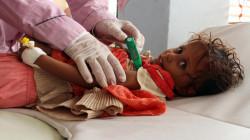
SANAA, Nov. 16 (Saba) – Yemen remains the world’s largest humanitarian crisis. After more than 4 years of a deadly conflict, millions of Yemenis suffer the consequences of intense fighting compounded with looming famine, outbreaks of epidemics and preventable diseases.
Imports and distribution of food, fuel and medicine remain restrained, insufficient and costlier. This is due to the restriction of access to humanitarian assistance and the constant deterioration of the economic situation. In various parts of the country especially in Hodeidah, water and power plants, factories, markets and shops have stopped functioning.
The public health situation is dire, with several epidemics reported by health organisations. The country has been struggling with a record cholera outbreak since 2017; in 2019, more than 10,000 suspected cases were reported on a weekly basis in the 5 most affected governorates.
The depreciation of the Yemeni rial has worsened the crisis. Unless the economy stabilises, an additional 3 to 5.6 million Yemenis risk food shortages in the coming months.
The United Nations and humanitarian partners report that around 70,000 people have been killed since 2016. During the war, more than 4 million people have been forced to flee their homes. More than 680,000 people have been displaced in 2018, mostly because of the fighting in Hodeidah governorate and along the west coast.
In addition, more than 100,000 people were displaced in 2019 due to the intensification of fighting in al-Dhalee governorate. Reports of grave violations against women and children have spiked dramatically.
Speaking from Hodeidah, Dr Mariam Aldogani, Save the Children’s Hodeidah Field Manager, said:"The situation in Hodeidah has become unbearable because of the conflict. I’m seeing more and more children coming in with suspected cholera. They all drink from an open well and don’t even have enough money to buy cooking gas needed to boil the contaminated water they collect."
Speaking from Sanaa, Tamer Kirolos, Save the Children’s Yemen Country Director, said:
Children in Yemen are experiencing severe hardships that no child should endure, facing multiple threats from bombs to disease and extreme hunger. It’s unacceptable that they’re dying from entirely preventable causes.
Treating cholera is straightforward providing children can get the rehydration and antibiotics they need, and hospitals and clinics are adequately equipped. But nearly five years of conflict has led to a near-total collapse of the health system in Yemen.
There are no aboveground water sources in Yemen so the vast majority of communities depend entirely on wells and water trucks to meet their daily needs. Even in towns and cities water systems are in a state of disrepair or damaged from the fighting. Limited availability often results in poor hygiene practices and sanitation, heightening the risk of further cholera outbreaks.
Written by Mona Zaid